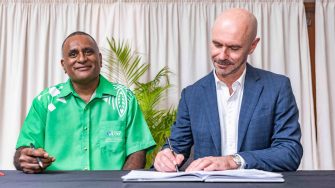Team members sought for research in the Pacific
Project Halophyte is offering PhD opportunities focusing on humanitarian engineering and mangrove research
Project Halophyte is offering PhD opportunities focusing on humanitarian engineering and mangrove research

Researchers from UNSW Sydney and the University of the South Pacific (USP) are building a team to help transfer two large-scale nature-based solutions developed at UNSW to Viti Levu, Fiji, in a pilot effort to reduce the intense pressures on lands, waters and communities in the Pacific. Over five years, researchers will implement and track the environmental, social, and economic outcomes of the project, working in partnership with the Fijian Government, local communities, SPC, UNESCO, and other stakeholders.
The official grant agreement for ‘Project Halophyte’, opens in a new window was recently signed in Suva Fiji between UNSW and USP. In partnership with local communities, the project will undertake large-scale coastal restoration by re-instating natural tidal flows as well as revitalising urbanised coastlines using floating mangrove islands. It is anticipated to provide environmental, economic and social benefits.
The five-year partnership, supported by philanthropic funding from Swire Shipping, opens in a new window, is currently seeking PhD researchers to join the team. Successful candidates will work in a fully immersive international team and have the opportunity to enrol in a Cotutelle PhD program, where they are based in their host institution (USP or UNSW) but spend significant time at the partner institution and are ultimately awarded a PhD degree from both UNSW and USP.
The Project Halophyte website emphasises the unique opportunity to make a real difference in the region, saying, “We are not just seeking PhD candidates, but potential team members who will play a pivotal role in this endeavour, undertaking research activities that guide restoration activities and outcomes within the South Pacific.”
“This project is not just about research—but about making a real difference in the lives of coastal communities and the environment, and your contribution could be instrumental in achieving this.”
Current PhD opportunities include measuring the environmental, social, and economic impacts of mangrove restoration; identifying tidal restoration opportunities to increase coastal ecosystem services and resilience; and enhancing coastal resilience through innovative nature-based mangrove designs.
Applicants for UNSW-based PhDs close on 30 August and position descriptions are available on the Project Halophyte website.